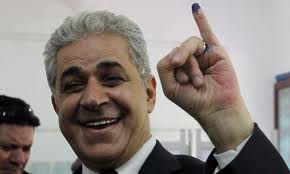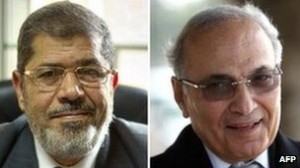 The candidate who is said to have come third – missing out on a run-off – in Egypt’s historic election has demanded a recount, citing many “violations”.
The candidate who is said to have come third – missing out on a run-off – in Egypt’s historic election has demanded a recount, citing many “violations”.
Hamdin Sabbahi, from the leftist al-Karamah party, said conscripts had voted illegally.
Mr Sabbahi missed out on the second round by 700,000 votes, according to unofficial results from state media.
Next month’s run-off will be between candidates from the Muslim Brotherhood and the Mubarak-era regime.
The Brotherhood candidate, Mohammed Mursi, has a slight lead on former Prime Minister Ahmed Shafiq, with a reported 25.3% of votes against 24.9%.
Mr Shafiq, Hosni Mubarak’s last prime minister, pledged there would be “no going back” to pre-revolutionary Egypt.
“I pledge now, to all Egyptians, we shall start a new era. There is no going back,” he was quoted by the AFP news agency as saying. “We must accept the results.”
Voting in the first round took place peacefully on Wednesday and Thursday.
The official results will be announced on Tuesday, but state media have been reporting tallies from polling stations around the country and have now confirmed the two front-runners.
The vote was hailed as a historic achievement by international observers but the BBC’s Jon Leyne in Cairo says many Egyptians – particularly supporters of the revolution – will find the choice they have been left with most unappealing.
Former US President Jimmy Carter, who led a delegation of election observers, said in spite of some violations the polls had been “encouraging”.
Polarised
Mr Sabbahi’s spokesman Hossam Mounis said the legal challenges to the election results would be lodged on Sunday, according to the AP news agency.
“The evidence we have, and that we are still accumulating, shows a big number of violations in many polling centres that would affect the final results,” he said.
He is said to have gained 21.5% of the votes cast.
Mr Sabbahi’s lawyer told the Reuters news agency that he would ask for the election to be halted until the complaints had been investigated.
 A spokesman for the Muslim Brotherhood said Egypt would be “in danger” if Mr Shafiq won, and the group would reach out to other candidates to defeat him.
A spokesman for the Muslim Brotherhood said Egypt would be “in danger” if Mr Shafiq won, and the group would reach out to other candidates to defeat him.
Warning of “determined efforts to recreate the old regime”, the Brotherhood urged parties which supported the uprising that overthrew Mr Mubarak last year to unite around their candidate.
They invited a range of opposition figures to a meeting on Saturday.
Both the Brotherhood and Shafiq campaigns have accused each other of “stealing” the revolution.
Shafiq spokesman Ahmed Sarhan urged pro-revolutionaries to vote for his candidate, saying that while his programme was about “the future”, the Brotherhood’s was about “an Islamic empire”.
The polarised choice remaining in the run-off suggests Egypt could be entering a new period of confrontation, our correspondent says.
Ahmed Khairy, spokesman for the Free Egyptians Party, a secular liberal party which emerged last year, said the outcome of the first round was “the worst possible scenario”, reported Egyptian newspaper al-Ahram.
He described Mr Mursi as an “Islamic fascist” and Mr Shafiq as a “military fascist”.
The pro-revolution vote was split, the reported results suggest, between Mr Sabbahi and a moderate Islamist who broke with the Brotherhood, Abdul Moneim Aboul Fotouh, who came fourth with about 19%.
Mr Sabbahi dominated in many urban areas, including Alexandria, local reports suggested.
Former Arab League chief Amr Moussa trailed in fifth place.
Mr Mursi and Mr Shafiq represent very different strands of Egyptian society.
Mr Mursi is seen as belonging to a popular strand of political Islam that was excluded from the political process for many years under Mr Mubarak.
Analysts say Mr Shafiq drew his support from people fearful of an Islamist takeover, and those exhausted by the upheavals of the past 16 months.
Frustrated
About 50 million people were eligible to vote in the polls, in which 13 candidates were vying for the presidency.
It was the country’s first freely contested presidential election in its history. Observers said it had been conducted peacefully.
The military body that assumed presidential power in February 2011 – the Supreme Council of the Armed Forces (Scaf) – has promised a fair vote and civilian rule.
Until a new constitution is approved, it is unclear what powers the president will have, prompting fears of friction with a military which seems determined to retain its powerful position.
Many Egyptians have grown frustrated with the pace of change in their country following the revolution, as the economy languishes, public services break down and crime levels rise.
BBC

Leave a Reply
You must be logged in to post a comment.